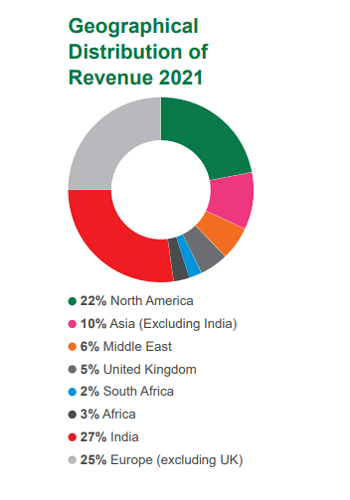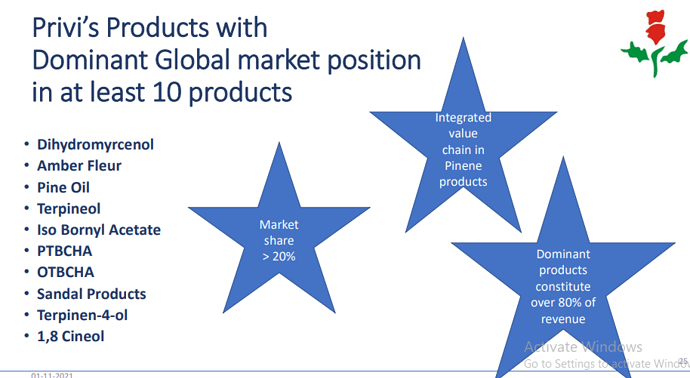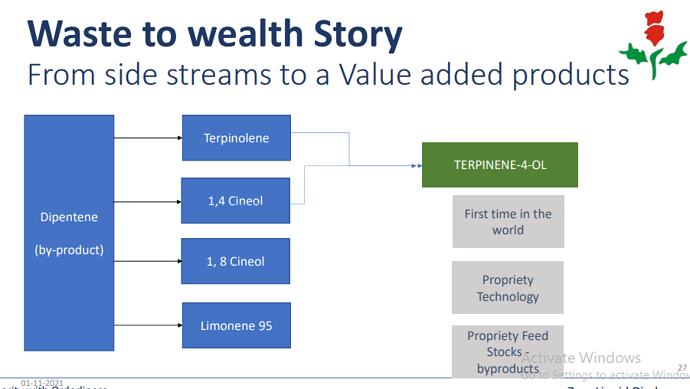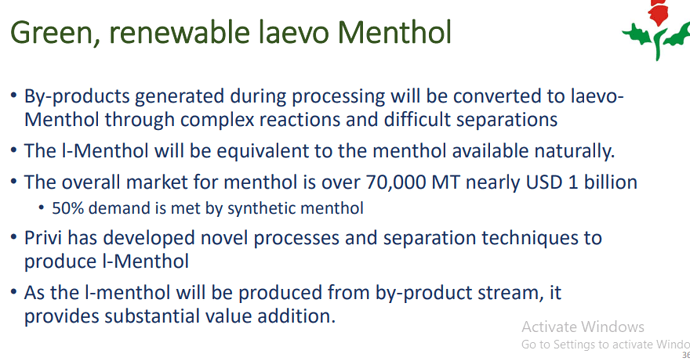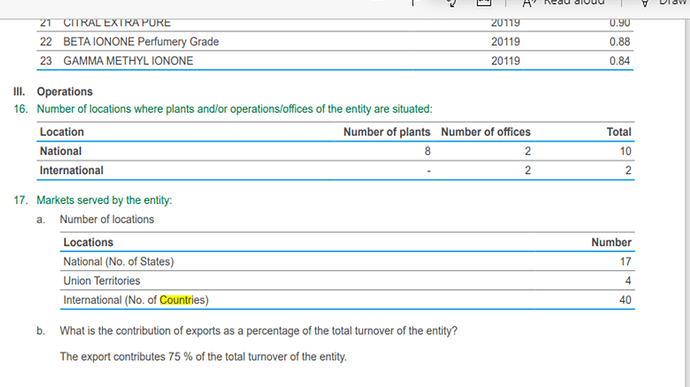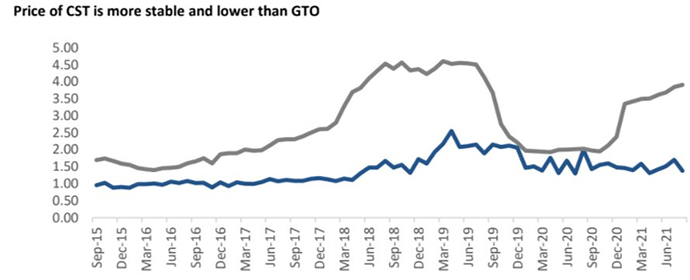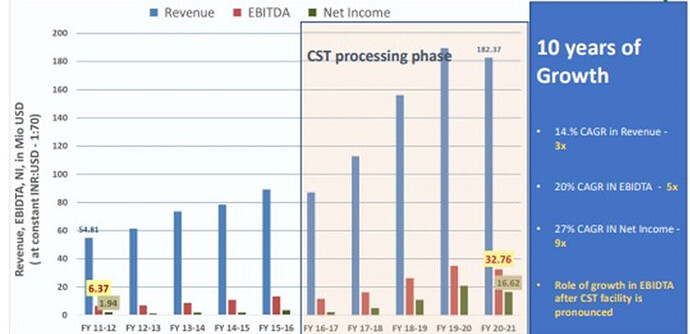Privi speciality chemical
• Privi is India’s largest manufacturer and exporter of aroma chemicals. Almost one third of the aroma chemicals produced globally are made from chemicals obtained from a Pine tree. Company started with only 2 products in 1992 and today have expanded their portfolio to over more than 74 products. And expects to keep trend going forward with three to four new products launch each year. Company has two manufacturing facilities at Mahad in Maharashtra and Jhagadia in Gujarat.
• Privi speciality operates in aroma chemical which are used in fragrance and flavour industry used in soaps, shampoo, detergents, cosmetics and toiletries and the most importantly in perfumes. The company cater to the worlds 10 largest fragrance companies and have a significant presence in Europe and USA. 70% of production of Privi comes from pine tree.
Pinene based products- Dihydromycrenol(dhmol) and Amber fleur accounts for sizeable revenue. Both these chemicals are used in fragrances
- Dhmol is also called as God’s molecule as it is used in 99% of the perfumes, and Privi controls around 30% of market share of dhmol in the world.
- Amber fleur is a royal molecule of F&F(Flavour and fragrance) industry because of its velvety nature. Expected growth of this product is around 5-6% pa.
WHAT I LOVE ABOUT THIS COMPANY WHICH MADE ME DIG DEEPER ABOUT THIS COMPANY IS ITS WASTE TO WEALTH STORY.
Waste to wealth story depicts how this company makes revenue through by products of different raw waste materials using technology and with guidance of good R&D team.
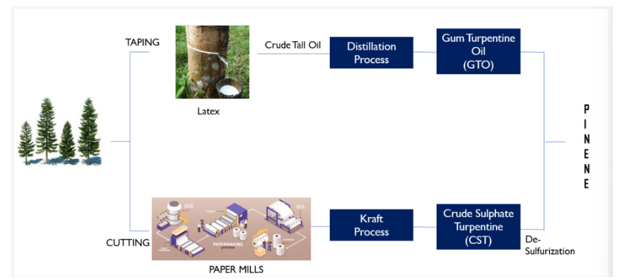
Both crude sulphate turpentine and gum turpentine oil are natural products derived from pine trees, but they differ in their extraction methods, composition, uses, and quality. Gum turpentine oil is obtained through the distillation of pine oleoresin and is commonly used in various industries, while crude sulphate turpentine is a byproduct of the pulp and paper industry.
Difference between GTO and CST
GTO Method
• Gum turpentine oil is obtained directly from pine trees. When the bark of pine trees is cut or wounded, a sticky resin is exuded, known as oleoresin. This oleoresin contains gum turpentine oil and rosin. Gum turpentine oil is obtained through the distillation of this oleoresin.
• Gum turpentine oil is a more refined product compared to crude sulphate
turpentine. It mainly consists of alpha-pinene and beta-pinene, along with smaller amounts of other terpenes. The distillation process results in a purer and more standardized product.
• GTO process is the most common way is being adapted by most companies
• Major raw material supplier of GTO is China accounts for around 70% of worlds production.
CST METHOD
• Crude sulphate turpentine is obtained as a byproduct of the Kraft pulping process used in the paper and pulp industry. When pine wood is processed to produce paper pulp, chemicals are used to break down the lignin in the wood. As a result, crude sulfate turpentine is released as a byproduct.
• Sulphur content in CST is too much which has very foul smell which needs to go through refinery process to make it suitable for aroma chemical
In Asia only PRIVI is the company which has refinery to refine CST
Privi has long term tie up with the world largest mills for raw material supply. Privi has Right to first refusal to this raw material
Some key advantage of CST over GTO
• Pricing: Price of CST is more stable than GTO in world market above in the picture depicts the price volatility between CST and GTO.
• Privi with a cost advantage through its backward integration as CST can be sourced much more easily and cheaply than GTO. As we know China is the largest producer of GTO in the world, so indirectly companies are dependant on supply chain with China
• As the price range of CST remains stable Privi is being able to procure higher margins and better valuations over the time.
Privi is one of the few companies in the world which is able to understand the chemistry of CST and showing magnificent results out of it.
This is how adapting to CST brought in great results for the company here is the above chart showing the 10 years growth of the company.
From by-product to value added product by Privi
- Dipentene is a by-product generated through terpineol and camphene, with further processing of dipentene a product is formed called second generation herbicide which is used in agriculture purpose.
- The Dream project of PRIVI
Privi has USFDA approved plant to manufacture pharma- grade camphor. To obtain camphor, the oleoresin is harvested from the pine tree. The oleoresin is then subjected to a purification process to separate the camphor crystals from the other components of the resin. The camphor is typically further processed and refined to obtain pure camphor crystals, which can be used for various purposes.
- The Bio Renewable Laevo Menthol Equivalent to natural Menthol, company have worked around 7 years into this project. The process of making l- menthol is hard to make as involves complex reactions and difficult separations. Menthol margin will be higher, minor details given by management.
Other cost effecient methods by company
• Sulphur content which is left over while going through CST process is also being extracted which is also a source of revenue for the company.
• Harmful gases are being trapped while production of aroma chemical are being used as heating of water to create steam for further production of various other chemical.
• Company has setup various filtering processor to reuse contaminated water left out during processing the same filtered water .
CUSTOMERS PF PRIVI
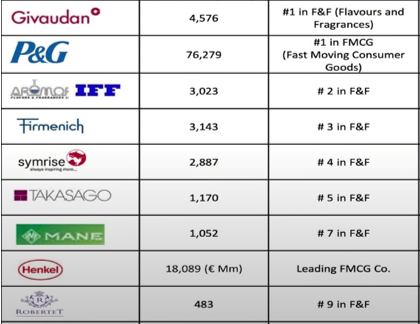
Givaudan is a global industry leader creating game changing innovations in food and beverage as well as inspiring creations in the world of scent and beauty, Givaudan operates in the expanded market space of flavour & taste, functional & nutrition ingredients, fragrance & beauty.
“We are excited with this opportunity to be partnering with Givaudan to support and expand their production of speciality fragrance ingredients. We look forward to showcase our knowhow and manufacturing expertise as a trusted partner through this strategic joint venture.” by management
Privi has signed a 5 years agreement with Givaudan in which Privi will supply 40 highly specialised molecules which will be low in volume but high in value (high margins).
The other key customer which has recently connected to Privi is RECKITT BENCKISER who is manufacturer and distributor of personal care, household, specialty products, nutrition, toiletry and health care products. The company sells its products with brand name DETTOL.
Aroma chemical companies in India will be benefited from ‘China-plus-one’ strategy and the government’s campaigns ‘Make in India’ and ‘Self-reliant India’ to boost domestic manufacturing and promote Indian products in the global markets. Global players are evaluating viable alternative manufacturing countries like India to reduce their reliance on China and diversify supply risk. Furthermore, the Indian aroma chemical industry benefits from less-stringent environmental norms as compared to China.
MANAGEMENT
Mr. Mahesh P Babani
Chairman & Managing Director
Over the past 2 decades, he has travelled extensively across the globe and has deep knowledge of the entire value chain of Aroma Chemical Business. His knowledge extends from sourcing of raw materials to their processing and to the final consumers of Aroma Chemicals. He has strong relationships across the management level of PRIVI’s customers, suppliers and other stake holders. Mr. Mahesh Babani is a Commerce Graduate and has operational and managerial experience of over 30 years.
Mr. Anurag Surana
Non-Executive, Independent Director
Mr. Anurag Surana has over 2 decades of experience in Chemical Industry is a known and reputed name in the industry and has brought immense value to the Board by providing inputs on manufacturing operations and management controls. Mr. Surana was associated with PI Industries as a Whole-time Director till September 2012. Presently, he is the Managing Director of KAGASHIN Global Network Private Limited. He is undergraduate and has completed his education from University of Delhi. He is a Director on the Board of IFFCO-MC Corp Science Pvt Ltd, Nichino India Pvt Ltd, Nichino Chemical India Pvt Ltd, Kagashin Global Network Pvt Ltd, Esco Agencies Pvt Ltd and Neogen Chemicals Limited.
Mr Anurag Surana has brought in lots of clients for the company he has worked with and for Privi as well.
Entry barrier
• There are no significant technology barriers in the space. However, established players have a critical advantage in terms of client relationships.
• Global Flavours& Fragrances houses derive most of their revenue from mature FMCG players.
• Competition among the larger players is often price based, which is the consequence of limited product differentiation.
• Companies that are able to create product differentiation would be in a position to build better margins and protect themselves. Company need to approve their products from the customer which is a big challenge for the company as it usually takes years for the products to be accepted.
RISK
- Compliance with strict pollution control norms regulations regarding water discharge.
- 70% of raw material is being imported from various other countries. Any change in import rules and duties may effect company operations.
-
Side effects related to synthetic aroma chemicals may constrain industry growth . The use of synthetic fragrances can cause issues such as skin irritation and rashes due to chemical composition of various harsh chemicals which may not suit every person**.**
- The key market players are focussing on producing natural fragrances, due to the consumer preference for natural fragrances and concerns regarding synthetic fragrances due to health risks. India has become a prominent global supplier of natural fragrant raw materials such as essential oils of menthol mint, sandalwood, jasmine and spices.
- The chemical substance used in fine fragrances, cosmetics and toiletries, food and beverages provide user with distinct fragrances and experience
- The Company has high inventory days which have gotten larger due to supply disruptions recently. This means that a significant amount of the Company’s capital remains always stuck in inventory
- Mahad is a flood-prone area in Maharashtra which saw water levels rise to 25 feet in the Maharashtra flood last year. This risk from floods forms a significant threat to Privi’s operations in its Mahad plant.
competitor
The global fragrance and flavour market is largely oligopolistic with a few aroma formulators, India’s largest aroma chemicals company SH Kelkar is also a formulator. Privi Speciality Chemicals and Oriental Aromatics Ltd. are suppliers of raw materials that go into making these chemicals. Eternis Fine Chemicals Ltd. and Anthea Aromatics Pvt. are their unlisted peers.
Oriental aromatic
The company uses gum turpentine oil to manufacture aroma chemicals. In the earnings call, the company’s Chief Executive Officer Parag Satoskar said it expects capex investment to contribute 1.7 times to the top line. The management expects to renegotiate/pass on/work out prices with customers to absorb the increase in raw material costs.
Company is one of the largest manufacturers of variety of specialty based aroma chemicals, and camphor, with a vast product range including Synthetic Camphor, Terpineols, Pine Oils, Astromusk. Company started its camphor production since 1964 using technology from DUPONT of USA. Major chunk of revenue for OAL comes from camphor as we now company extracts chemical through gto process making of camphor is bit easy through this process. The company currently has a market share of nearly 33% and intends to scale up the same to 35-40%. But
The Bodani family have extensive experience in the chemical industry from last 6 decades
As per the latest commentary by the management all the plants are running at almost full capacity, which invites the need for further capacity addition to cater to the increasing demand from the customers. Thus, the management has planned a capex of approximately Rs3500-4000 million for next 3-5 years, as per Crisil report.
Eternis fine chemical (2nd competitor)
Eternis is an pvt ltd company which deals in all kind of aroma chemicals and major business is through export.
with only 12 popular formulas in the portfolio and a few specialty chemicals for specific clients, Eternis has created a strong foothold in the global market and caters to nearly 45 clients across 20 countries. Their molecules are primarily used in soaps, detergents, household products, fragrances and fine fragrances.
Mariwala believes that in India, Eternis’ primary competitor is Privi Organics(now Privi speciality) which makes 33 aroma chemicals and beats Eternis in terms of revenue, at ₹13.4 billion in FY19. One of the products that Eternis added in 2016 is coumarin, the chemical that boosted its revenue growth in FY18. An extremely popular ingredient in perfumes, coumarin smells like fresh hay and is used to support odours such as lavender and rosemary. Due to the versatility of the product, Eternis sought to expand its coumarin business and acquired the market leader in this formula — AIMS Impex last year. The deal was reportedly worth ₹500-600 million and it consolidated the company’s position in this chemical. This gave a boost to their existing capacity of 1,500 tonne. Eternis is now its only manufacturer in India.
CONCL
Privi caters their products worldwide, the most used aroma chemicals in the perfumes and scents are Dhmol and amber fleur. Privi holds 30% market share worldwide for these chemicals. Privi is one the most preferred company by 10 largest f&f players in providing aroma chemicals molecules. Recently they came into JV with the Givaudan (Swiss multinational manufacturer of flavours, fragrances and active cosmetic ingredients). Talking about the process of extracting pinene based products is through CST which is bit complex but provides competitive advantage as raw material is very cheap and they have connection with largest paper mills companies in the world to provide pulp to Privi. Coming forward company is now extending their products portfolio, recent capex in galaxmusk chemical and camphor. Privi hold USFDA approved pharma industrial grade camphene manufacturing. The camphene is hydrogenated to make isoborneol which is used in commercial manufacturing of camphor Limonene is used to manufacture citrus based aroma chemicals.
Overall, the growth in FMCG will drive the growth for the F&F industry. The demand is expected to be robust in near future Companies like HUL, PepsiCo, P&G, Coca-Cola, Colgate, The Kraft Heinz Company and other players are in constant requirement of the F&F raw materials for meeting consumer demand.
Aroma chemicals are synthetic aromas. Virtually all perfumes on the market are composed of aroma chemicals. 75-90% composition of a perfume fragrance is aroma chemicals.
DISC- The report constitutes facts and is being collected through reliable sources. Report is made only for Educational purpose and does not constitute any kind of Buy/Sell recommendation.

